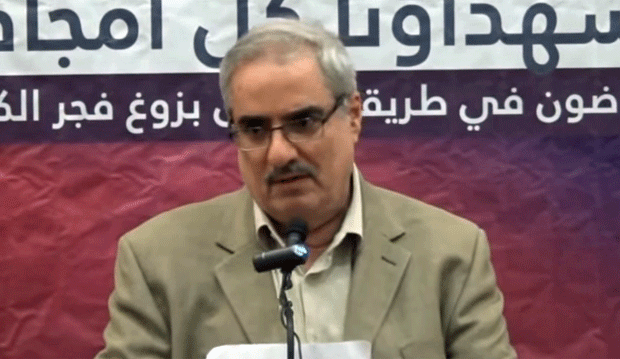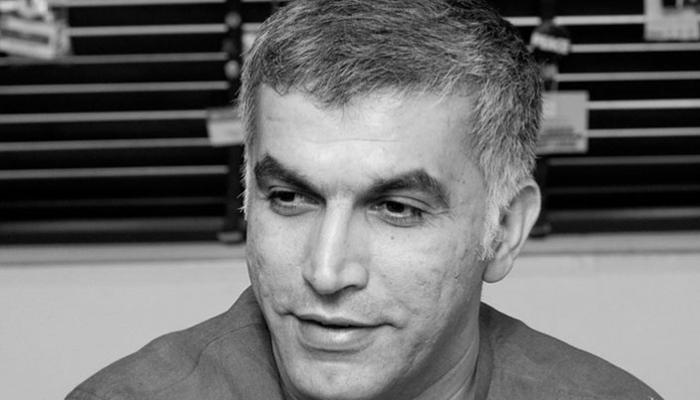Bahrain charges Ebrahim Sharif for AP interview after Prince Charles visit
[vc_row][vc_column][vc_column_text]
Bahrain’s public prosecution on Sunday 13 November charged leading opposition politician Ebrahim Sharif under article 165 of the penal code with “inciting hatred against the regime,” after he spoke to the Associated Press last week. We, the undersigned, consider this to be a violation of his right to freedom of expression and a reprisal against his political activity.
The charge carries a three-year sentence and comes after Prince Charles’ controversial visit to the Gulf monarchy last week. It is the latest development in the Bahraini government’s intensified crackdown on civil society in the past year.
Speaking on Prince Charles’ arrival in the country Sharif, the former leader of the secular National Democratic Action Society (Wa’ad), told AP he was afraid the visit would “whitewash” human rights abuses.
Sharif told AP: “I don’t see what’s gone on behind closed doors or whether the prince raised any questions of human rights. Bahrain’s government values its relations with the U.K. and if the U.K. puts its weight behind the improvement of human rights in Bahrain, the government will listen. They need friends.”
He further said: “All parties should compromise. We can’t have absolute power in the hands of the ruling family.”
“Ebrahim Sharif was expressing his opinion and no one should ever be prosecuted for that,” said Sayed Ahmed Alwadaei, Director of Advocacy at the Bahrain Institute for Rights and Democracy (BIRD). “Bahrain claims to be inclusive, that’s the image they tried to sell with Prince Charles’ visit. But Sharif’s prosecution reveals the barefaced lie.”
Prince Charles’ visit courted controversy, with campaigners accusing him of participating in a PR exercise aimed at hiding Bahrain’s poor human rights record. In his visit, the Prince of Wales highlighted religious tolerance in Bahrain, a theme also highlighted by visiting Middle East Minister Tobias Ellwood MP, visiting the Al Fateh Grand Mosque and Bahrain’s Hindu temple, and meeting members of the country’s Jewish community. But the royal tour failed to meet with members of the Shia community, who make up a majority of Bahrain’s citizen population, and who have faced heightened discrimination from the government in the past months. In August, five UN experts called on Bahrain to end its “persecution of Shias”.
Ebrahim Sharif is the former Secretary General of Wa’ad. He was a member of the Bahrain 13, a group of high profile activists arrested, tortured and sentenced by military court in 2011. He was released in June 2015, but re-arrested weeks later and sentenced to another year in prison for a political speech he gave calling for continued peaceful opposition. Sharif was released from prison in July 2016. He is currently under a travel ban order.
At the time of Sharif’s June 2015 release, the US State Department lifted an arms ban on Bahrain, citing “meaningful progress on human rights.” However, Bahrain’s Ministry of Interior re-arrested him less than three weeks later on charges of “inciting regime change and hatred and contempt against the regime.” A court found him guilty and sentenced him to one year in prison. As a result of the deteriorating human rights situation in the country, including Sharif’s re-arrest, both the US Senate and House of Representatives introduced bipartisan legislation calling for the resumption of an arms ban on the Bahrain Defense Force (BDF) and National Guard, forbidding the sale of weapons that could be used to suppress peaceful dissent. The bills would allow for the sale of arms only after the Secretary of State certifies that the Bahraini government has fully implemented all 26 recommendations made by the Bahrain Independent Commission of Inquiry (BICI) in 2011. As of 2016, the US State Department assessed that key recommendations of the BICI still have yet to be implemented by the Bahraini government and, Americans for Democracy & Human Rights in Bahrain (ADHRB), the Bahrain Center for Human Rights (BCHR), and BIRD have found that only two of the Commission’s recommendations have been fully implemented.
“Though the Bahraini government continues to falsely claim that it has implemented all 26 BICI recommendations, virtually all independent assessments reveal a complete failure to reform on key human rights issues,”said Husain Abdulla, Executive Director of ADHRB. “The prosecution of Ebrahim Sharif for his interview with AP follows the authorities’ decision to similarly charge prominent human rights defender and BCHR president Nabeel Rajab for his open letter in the New York Times. These actions clearly demonstrate that the government remains committed to suppressing all forms of criticism.”
The Government of Bahrain’s actions violate the freedom of expression, as protected under Article 19 of both the Universal Declaration of Human Rights and the International Covenant on Civil and Political Rights, which Bahrain acceded to in 2006.
We condemn this violation of the right to free expression and call for the immediate dropping of all charges against Ebrahim Sharif, and all other persons prosecuted for their speech.
Signed,
Americans for Democracy & Human Rights in Bahrain (ADHRB)
Bahrain Center for Human Rights (BCHR)
Bahrain Institute for Rights and Democracy (BIRD)
European Centre for Democracy and Human Rights (ECDHR)
Index on Censorship[/vc_column_text][/vc_column][/vc_row][vc_row][vc_column][vc_basic_grid post_type=”post” max_items=”4″ element_width=”6″ grid_id=”vc_gid:1479198588631-d2e752f2-c2f3-0″ taxonomies=”7706″][/vc_column][/vc_row]


